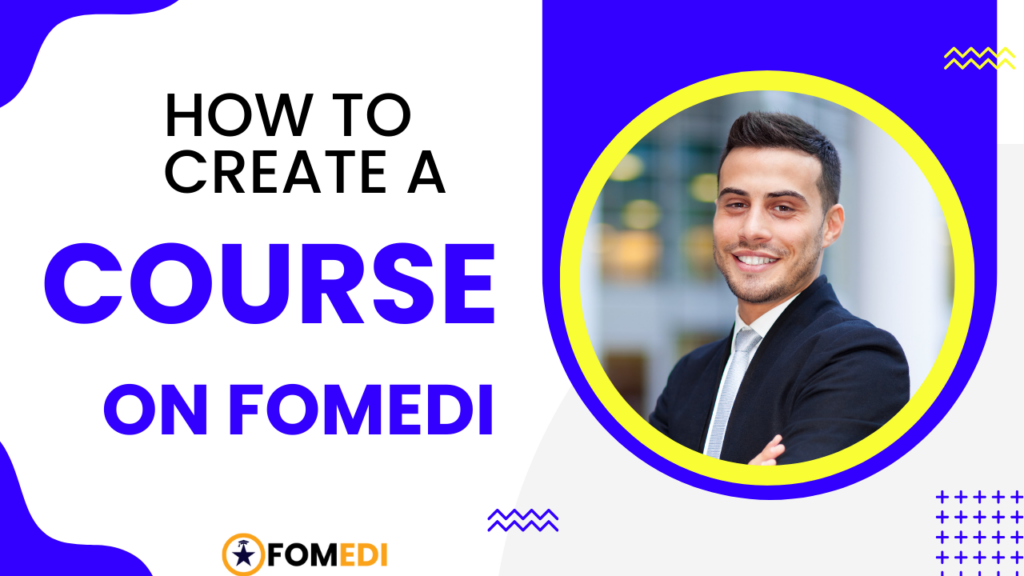
Guide to Creating Your First Course on Fomedi
Are you ready to share your expertise with the world and monetize your knowledge? Look no further than Fomedi, our premier online course marketplace designed to empower educators like you. With Fomedi, creating and selling your own courses has never been easier. In this guide, we’ll walk you through the simple steps to create your very first course on our platform.
1. Login to Your Account: The journey begins by logging into your Fomedi account. Once logged in, navigate to the course creation section and click on “Create a New Course.”
2. Choose a Title: Select a catchy and concise title for your course. Remember, simplicity is key, so aim for a title that effectively communicates the essence of your course without being too lengthy.
3. Write a Description: Craft a compelling description that outlines what your course is about, who it’s for, and what learners can expect to gain from it. Be sure to highlight the unique value proposition of your course to attract potential students.
4. Monetization Options: Decide whether you want to monetize your course by setting a price or offer it for free. Fomedi offers flexibility in pricing, allowing you to choose the option that best aligns with your goals.
5. Set Maximum Students: Determine the maximum number of students you’re comfortable accommodating in your course. This helps manage class sizes and ensures a quality learning experience for all participants.
6. Specify Course Level: Indicate the skill level required for your course, whether it’s beginner, intermediate, or advanced. This helps learners gauge whether the course is suitable for their current proficiency level.
7. Enrollment Expiration: Set a timeframe for enrollment expiration if desired. This can create a sense of urgency for potential students and encourage them to enroll sooner rather than later.
8. What Will I Learn?: Provide a breakdown of the key learning objectives and outcomes that students can expect to achieve upon completing your course. This helps set clear expectations and motivates learners to stay engaged throughout the learning journey.
9. Targeted Audience: Define the target audience for your course, including any prerequisites or background knowledge required. This ensures that your course attracts the right learners who will benefit the most from your content.
10. Total Course Duration: Estimate the total duration of your course, including the number of modules or lessons and their respective lengths. This helps students plan their learning schedule accordingly.
11. Materials Included: Specify any additional materials or resources included with your course, such as downloadable PDFs, video tutorials, or quizzes. This adds value to your offering and enhances the overall learning experience.
12. Requirements/Instructions: Outline any specific requirements or instructions for students to follow before enrolling in your course. Whether it’s software prerequisites, recommended reading materials, or assignment submission guidelines, clarity is key to facilitating a smooth learning process.
Once you’ve completed these steps, review your course details to ensure everything is accurate and then hit the publish button to make your course live on Fomedi. Congratulations, you’ve taken the first step towards becoming a successful online educator! Keep refining your content, engaging with your students, and leveraging Fomedi’s platform to grow your audience and impact lives through education. Happy teaching!
NB ;
Certainly! Ensuring the quality and relevance of courses on Fomedi is paramount to providing an exceptional learning experience for our students. To maintain these standards, tutors must adhere to the following requirements to get their courses approved:
1. Content Quality: The course content must be accurate, up-to-date, and presented in a professional manner. Tutors should ensure that all information provided is relevant to the course topic and delivered effectively to facilitate learning.
2. Engaging Instruction: Courses should be engaging and interactive to keep students motivated and actively participating. Utilize a variety of teaching methods, such as videos, quizzes, assignments, and discussions, to enhance learner engagement.
3. Clear Learning Objectives: Clearly outline the learning objectives and outcomes of the course to help students understand what they will gain from enrolling. Learning objectives should be specific, measurable, achievable, relevant, and time-bound (SMART).
4. Structured Curriculum: Organize the course content into logical sections or modules to guide students through the learning journey. Provide clear instructions on how to navigate the course and access different resources.
5. Responsive Support: Tutors should be responsive to student inquiries and provide timely support throughout the duration of the course. Encourage open communication and address any questions or concerns promptly to enhance the student learning experience.
6. Copyright Compliance: Ensure that all course materials, including text, images, videos, and other multimedia assets, adhere to copyright laws and regulations. Tutors should either own the rights to the content or have obtained proper permission for its use.
7. No Discriminatory Content: Courses should not contain any discriminatory or offensive content based on race, gender, religion, nationality, ethnicity, sexual orientation, or any other characteristic. Fomedi is committed to promoting diversity, equity, and inclusion in all courses offered on the platform.
8. Ethical Practices: Tutors must uphold ethical standards in their teaching practices and interactions with students. Avoid any form of academic dishonesty, such as plagiarism or cheating, and foster a respectful and supportive learning environment for all participants.
By adhering to these requirements, tutors can ensure that their courses meet the quality standards set by Fomedi and provide valuable learning experiences for students. We believe that by upholding these standards, we can create a thriving community of educators and learners who are passionate about knowledge sharing and lifelong learning.
